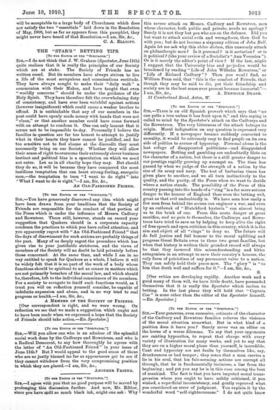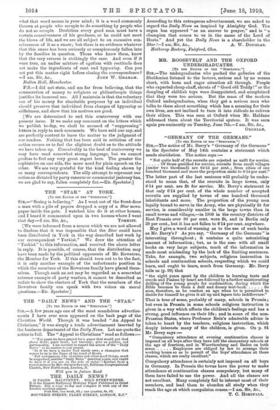LTO THE EDITOR OF TEE " SPiCTATOR."1
SIR,—Your generous, even excessive, estimate of the character of the Cadbury and Rowntree families relieves the violence of the moral situation somewhat. But in what kind of a position does it leave you P Surely never was an editor on the horns of a worse dilemma. To say that your opponents are canting hypocrites, to repeat that charge with every variety of illustration for many weeks, and yet to say that they are on a higher moral plane than yourself, is incredible. Cant and hypocrisy are not faults by themselves like, say, drunkenness or bad temper ; they mean that a man carries a lie in his soul, that his fair-seeming actions are corrupt all through, that he is fundamentally insincere, a liar from the beginning ; and yet you say he is in this case among the best of mankind. The fact is that you have imputed moral trans- gression where you ought to have mildly criticised, if you wished, a superficial inconsistency, and gently reproved what you considered an error of judgment. You explain it by the wonderful word "self-righteousness." I do not quite know
what that word means in your mind ; it is a word commonly thrown at people who scruple to do something by people who do not so scruple. Doubtless every good man must have a certain consciousness of his goodness, or he could not meet the blows of life, and we are all subject to an excessive con- sciousness of it as a snare; but there is no evidence whatever that this snare has been seriously or conspicuously fallen into by the families in question. Those who know them, know that the very reverse is strikingly the case. And even if it were true, an undue mixture of egotism with rectitude does not make the ingredients of cant and hypocrisy. Can you not put this matter right before closing the correspondence ?
P.S.—I did not state, and am far from believing, that the consecration of money to religions or philanthropic things justifies its immoral use. All I maintain is that the voluntary use of his money for charitable purposes by an individual should preserve that individual from charges of hypocrisy or selfishness, and show that his motives are good.
[We are determined to end this controversy with our present issue. If we make any comment on the letters which we publish to-day, we shall be accused of "suppressing" letters in reply to such comments. We have said our say, and are perfectly content to leave the matter to the judgment of our readers. Nothing that has been said in criticism of our action causes us to feel the slightest doubt as to the attitude we have taken up. Conceivably in the heat of controversy we may have used somewhat strong language, but we cannot profess to feel any very great regret here. The greater the sophistries on one side, the more need for plain speech on the other. We are very grateful for the kind feeling shown by so many correspondents. The silly attempt to represent our action as dictated by party rancour or commercial jealousy has, we are glad to say, fallen completely flat.—ED. Spectator.]











































 Previous page
Previous page